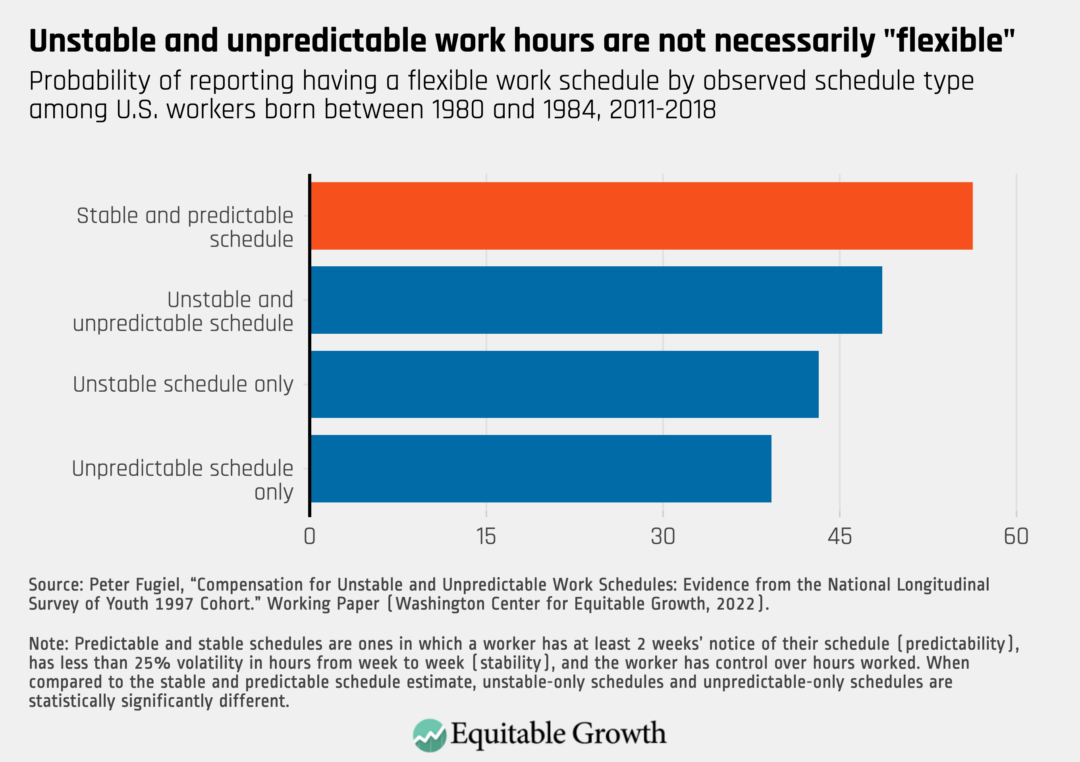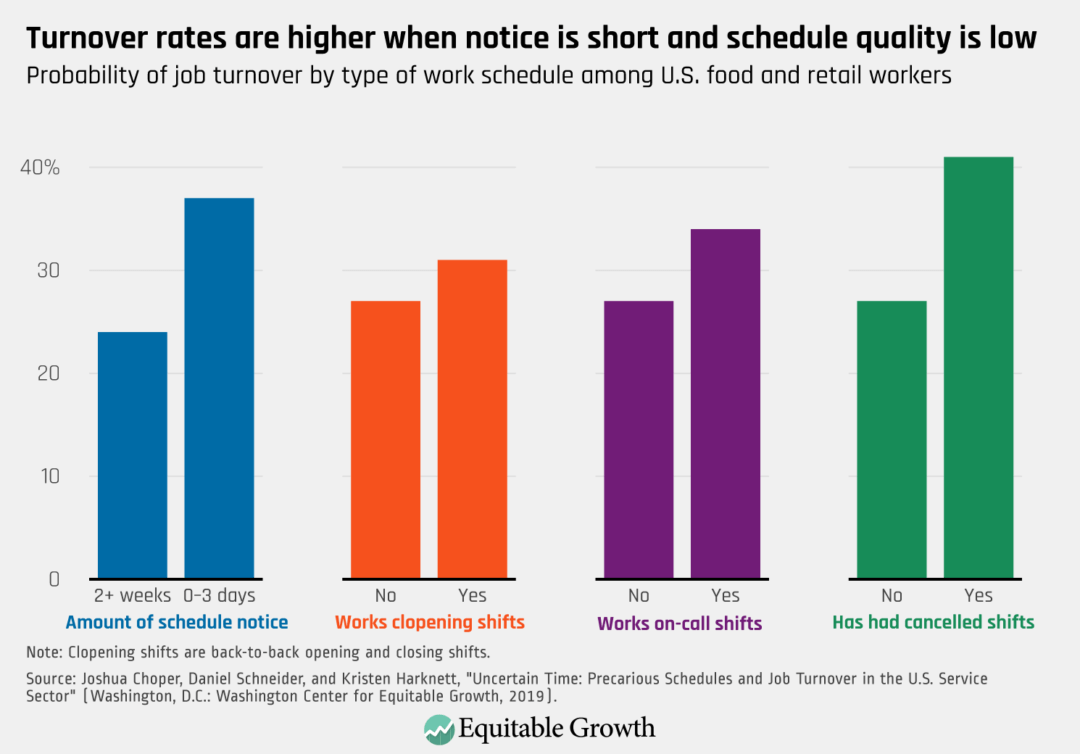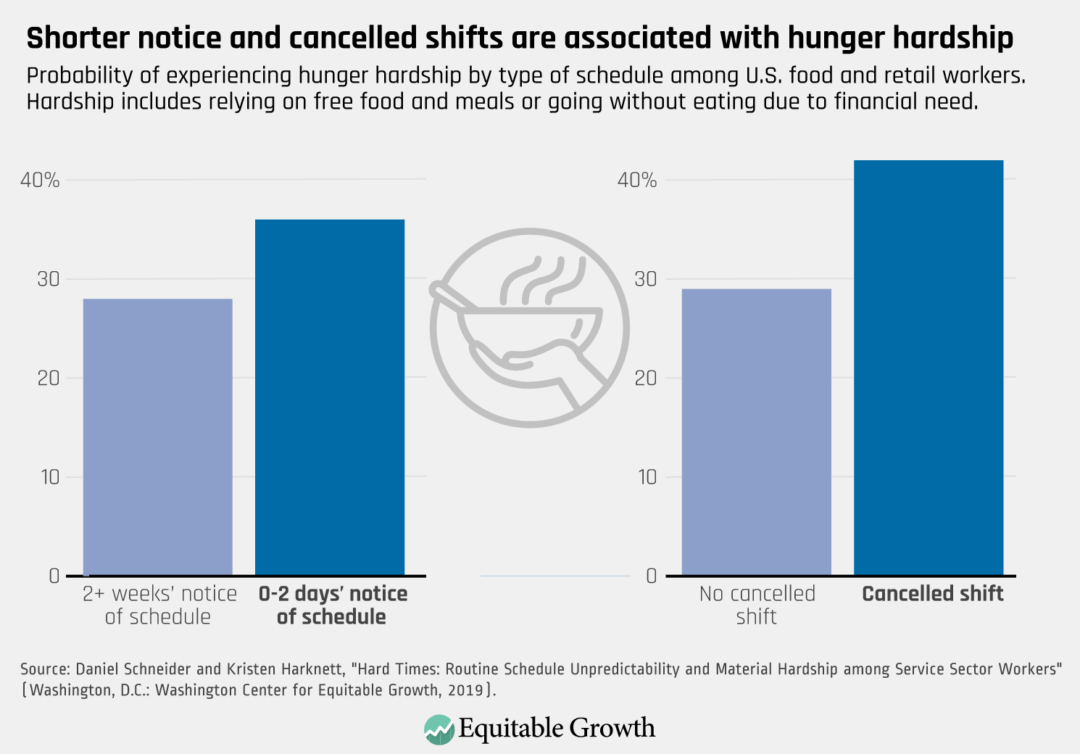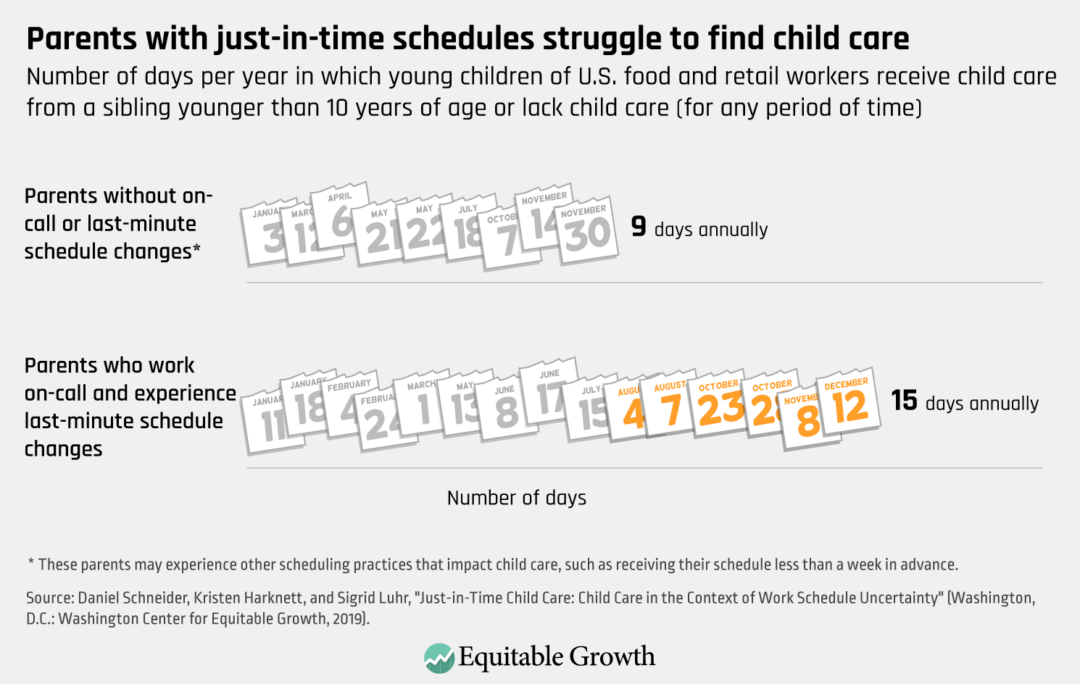Factsheet: Six frequently asked questions about schedule quality and Fair Workweek laws across the United States

Seven cities and one state have implemented Fair Workweek laws—legislation that aims to improve the quality of work schedules that employers offer to their workforce.1 If your jurisdiction is considering implementing a Fair Workweek law, you may be thinking about one or more of the frequently asked questions below. Fortunately, rigorous academic research has examined these questions and can provide answers.
FAQ one: What are the elements of schedule quality?
- Social scientist Susan Lambert of the University of Chicago identifies five ways that work schedules can be low quality:3
- Instability: The number of hours offered and timing of work vary week to week.
- Unpredictability: Workers cannot anticipate when they will be scheduled to work.
- Nonstandard timing: Scheduled hours occur early in the morning, late at night, or on the weekends.
- Inadequate hours: Scheduled hours are too few to earn an adequate paycheck.
- Lack of input: Workers have little or no say in when they work.
FAQ two: Do some workers prefer jobs with unstable or unpredictable schedules because they offer flexibility?
- Logic suggests that offering schedules that are unstable or unpredictable provides flexibility to employers. Research suggests, however, that workers do not experience these types of schedules as flexible.
- New research by sociologist Peter Fugiel at the University of Illinois looks at a nationally representative sample of workers in their 20s and 30s, and finds that workers in jobs with unstable schedules are 13 percentage points less likely to report having a flexible work schedule than they do in similar jobs with stable and predictable schedules.4 (See Figure 1.)
- The same study finds that workers with unpredictable schedules are 17 percentage points less likely to report having a flexible schedule than they do in similar jobs with stable and predictable schedules. (See Figure 1.)
Figure 1

- Fugiel’s research also shows that workers in unstable and unpredictable schedule arrangements report lower job satisfaction than they do in similar jobs with stable and predictable schedules.
FAQ three: Are workers compensated for taking jobs with less desirable scheduling practices?
- Fugiel further finds that workers in jobs with unstable and unpredictable schedules receive approximately the same pay as they do in similar jobs with better-quality schedules.5 They do not receive higher pay to compensate for their lower-quality schedules.
FAQ four: Do these scheduling practices help businesses’ bottom lines?
- Research finds that low-quality schedules do not help businesses become more productive and profitable.
- Research examining the experience of low-wage, service-sector workers, for example, finds that turnover—which is costly to businesses—increases when schedule quality is low.6 (See Figure 2.) Other research finds similar trends across a wider range of industries.7
Figure 2

- In fact, a randomized controlled trial conducted in partnership with The Gap, Inc. found that higher-quality schedules resulted in a 3.3 percent increase in sales and a total increase in store productivity of 5.1 percent.8
FAQ five: What are the consequences of low-quality schedules for workers and their families?
- Research conducted by public policy professor Daniel Schneider of Harvard University and sociologist Kristen Harknett of the University of California, San Francisco finds that when low-wage, service-sector workers have unpredictable schedules, they are more likely to experience hunger.9 (See Figure 3.)
Figure 3

- Schneider and Harknett also find that parents with unpredictable schedules struggle to find child care. (See Figure 4.)
Figure 4

- Further, research by economist Elizabeth Ananat of Columbia University and psychologist Anna Gassman-Pines of Duke University examining service-sector workers with young children finds that unpredicted changes to schedules decrease parents’ sleep quality and increase their reports of experiencing negative moods.10
- Because workers of color—and women of color in particular—are disproportionately exposed to unpredictable and unstable schedules, they are more likely to feel these consequences than other workers.11
FAQ six: Do Fair Workweek laws improve schedule quality?
- Rigorous academic research finds that Fair Workweek laws do not completely eradicate low-quality scheduling practices, but they do significantly decrease their prevalence.
- A study of the Fair Workweek law in Emeryville, California, finds that the ordinance decreased last-minute schedule changes and increased worker well-being—though some estimates did not reach statistical significance, perhaps because of the study’s relatively small sample size.12
- Using a larger sample, an evaluation of Seattle’s Secure Scheduling Ordinance finds significant positive impacts.13 Seattle’s law increased the share of workers who know their schedule at least 2 weeks in advance by 11 percentage points and decreased the share of workers experiencing last-minute shift changes without pay by 13 percentage points.14
- The implementation of the Seattle law was also associated with an 11 percentage point increase in reports of good sleep quality and a 10 percentage point decrease in the likelihood of experiencing a material hardship, such as hunger or housing instability.15
End Notes
1. National Women’s Law Center, “State and Local Laws Advancing Fair Work Schedules” (2019), available at https://nwlc.org/wp-content/uploads/2019/10/Fair-Schedules-Factsheet-v2.pdf.
2. Ibid.
3. Susan Lambert, “Fair work schedules for the U.S. economy and society: What’s reasonable, feasible, and effective” (Washington: Washington Center for Equitable Growth, 2020), available at https://equitablegrowth.org/wp-content/uploads/2020/02/Lambert.pdf.
4. Peter Fugiel, “Compensation for Unstable and Unpredictable Work Schedules: Evidence from the National Longitudinal Survey of Youth 1997 Cohort.” Working Paper (Washington Center for Equitable Growth, 2022).
5. Ibid.
6. Daniel Schneider and Kristen Harknett, “It’s About Time: How Work Schedule Instability Matters for Workers, Families, and Racial Inequality” (Berkeley, CA: The Shift Project, 2019), available at https://shift.hks.harvard.edu/its-about-time-how-work-schedule-instability-matters-for-workers-families-and-racial-inequality/.
7. Fugiel, “Compensation for Unstable and Unpredictable Work Schedules: Evidence from the National Longitudinal Survey of Youth 1997 Cohort.”
8. Saravanan Kesavan and others, “Doing Well by Doing Good: Improving Retail Store Performance with Responsible Scheduling Practices at the Gap, Inc.,” Management Science (2022).
9. Schneider and Harknett, “It’s About Time: How Work Schedule Instability Matters for Workers, Families, and Racial Inequality.”
10. Elizabeth O. Ananat and Anna Gassman‐Pines, “Work Schedule Unpredictability: Daily Occurrence and Effects on Working Parents’ Well‐Being,” Journal of Marriage and Family 83 (1) (2021): 10–26. [1] Elaine Zundl and others, “Still Unstable: The Persistence of Schedule Uncertainty During the Pandemic” (Cambridge, MA: The Shift Project, 2022), available at https://shift.hks.harvard.edu/still-unstable/.
11. Elaine Zundl and others, “Still Unstable: The Persistence of Schedule Uncertainty During the Pandemic” (Cambridge, MA: The Shift Project, 2022), available at https://shift.hks.harvard.edu/still-unstable/.
12. Elizabeth O. Ananat, Anna Gassman-Pines, and John Fitz-Henley II, “The Effects of the Emeryville Fair Workweek Ordinance on the Daily Lives of Low-Wage Workers and their Families.” Working Paper No. w29792 (National Bureau of Economic Research, 2022), available at https://www.nber.org/papers/w29792.
13. Alix Gould-Werth, Emilie Openchowski, and Raksha Kopparam, “New study in the Proceedings of the National Academy of Sciences shows schedule stability supports U.S. workers and the broader economy” (Washington: Washington Center for Equitable Growth, 2021), available at https://equitablegrowth.org/new-study-in-the-proceedings-of-the-national-academy-of-sciences-shows-schedule-stability-supports-u-s-workers-and-the-broader-economy/.
14. Ibid.
15. Kristen Harknett, Daniel Schneider, and Véronique Irwin, “Improving health and economic security by reducing work schedule uncertainty,” Proceedings of the National Academy of Sciences 118 (42) (2021).





